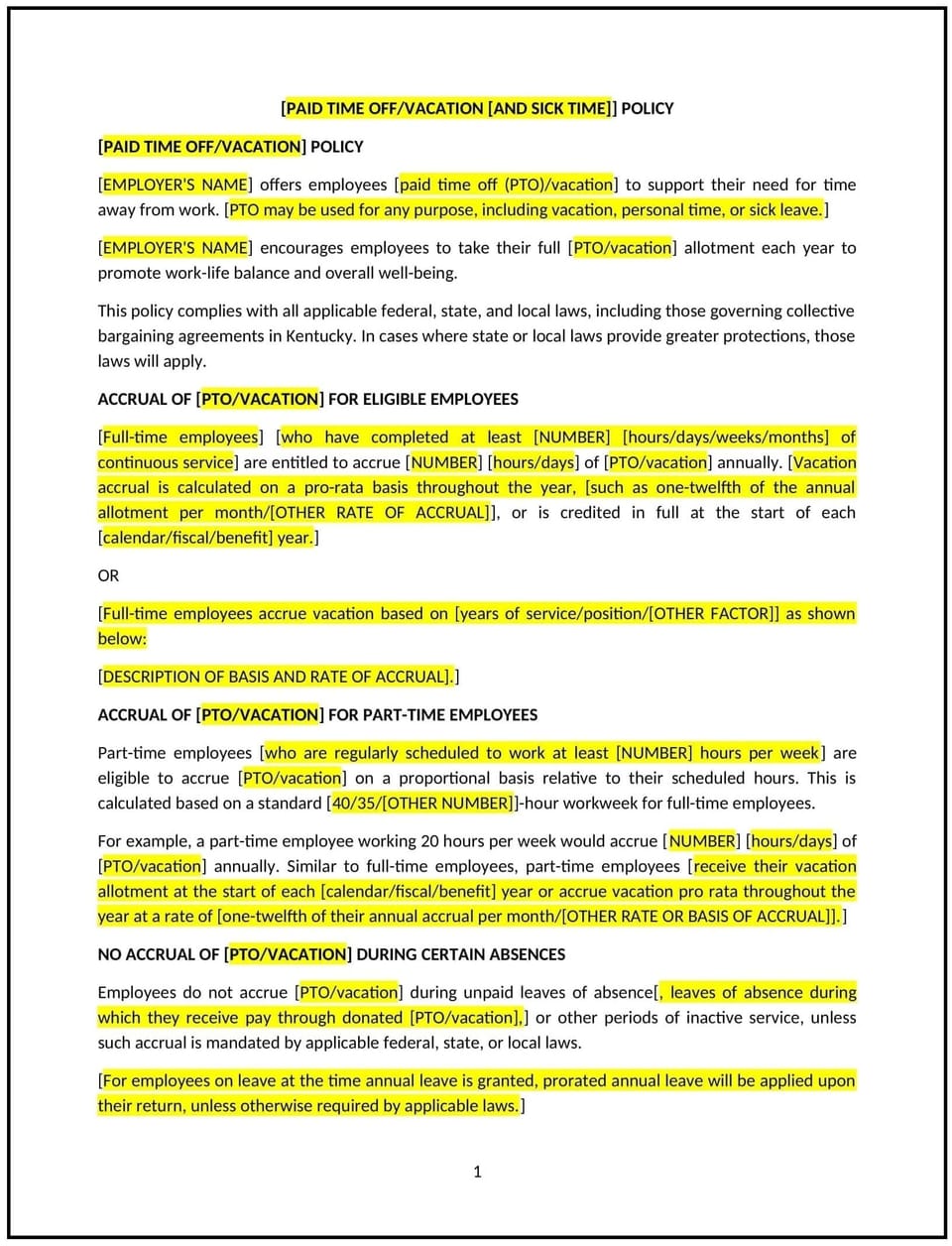Vacation policy (Kentucky): Free template

Vacation policy (Kentucky)
A vacation policy provides Kentucky businesses with guidelines for managing employee time off, including accrual, usage, and scheduling. This policy ensures consistency in granting vacation leave while balancing employee needs and business operations.
By adopting this policy, businesses can promote work-life balance, improve employee satisfaction, and maintain productivity.
How to use this vacation policy (Kentucky)
- Define vacation eligibility: Specify which employees are eligible for vacation leave based on their employment status (e.g., full-time, part-time, or temporary).
- Outline accrual rates: Explain how vacation time is earned, such as a fixed number of days per year or accrual based on hours worked.
- Include carryover rules: Specify whether unused vacation time can be carried over to the next year and any limitations.
- Establish scheduling procedures: Provide guidelines for requesting vacation leave, including advance notice requirements and approval processes.
- Address blackout periods: Identify any times of the year when vacations may be restricted due to business needs.
- Clarify payout rules: State whether unused vacation time is paid out upon termination of employment, in accordance with Kentucky regulations.
- Provide documentation requirements: Include any forms or processes required to request and track vacation leave.
Benefits of using this vacation policy (Kentucky)
This policy provides several key benefits for Kentucky businesses:
- Supports employee well-being: Encourages employees to take time off for rest and rejuvenation, enhancing morale and productivity.
- Promotes consistency: Ensures equitable treatment of all employees regarding vacation accrual and usage.
- Improves planning: Establishes clear procedures for scheduling leave, helping managers balance staffing needs.
- Enhances compliance: Aligns vacation practices with Kentucky laws and regulations.
- Reduces disputes: Provides transparency about vacation policies and reduces misunderstandings between employees and management.
Tips for using this vacation policy (Kentucky)
- Communicate the policy: Share the vacation policy with employees during onboarding and include it in the employee handbook.
- Train managers: Ensure managers understand the policy and can handle vacation requests fairly and consistently.
- Encourage vacation use: Remind employees to take their earned time off and avoid burnout.
- Monitor leave balances: Use tracking tools to manage vacation accrual and ensure compliance with carryover and payout rules.
- Review periodically: Update the policy as needed to reflect changes in Kentucky laws or business practices.
Q: How is vacation time accrued under this policy?
A: Vacation time is accrued based on the employee’s status and length of service, such as earning a set number of days per year or per hours worked.
Q: Can unused vacation time be carried over to the next year?
A: Unused vacation time may be carried over, subject to limitations outlined in the policy, such as a maximum carryover cap.
Q: How should employees request vacation leave?
A: Employees should submit a vacation request form or notify their manager with sufficient advance notice, as specified in the policy.
Q: Are there times when vacation requests may be denied?
A: Vacation requests may be denied during blackout periods or if they conflict with critical business needs, but efforts will be made to accommodate employees’ preferences.
Q: Is unused vacation time paid out upon termination?
A: The policy specifies whether unused vacation time will be paid out at termination, consistent with Kentucky regulations and the business’s practices.
Q: How does the business track vacation accruals and usage?
A: The business uses a tracking system or payroll software to monitor vacation balances and ensure accurate accrual and usage records.
Q: What happens if an employee doesn’t use all their vacation time?
A: Unused vacation time may be carried over, forfeited, or paid out, depending on the terms outlined in the policy.
Q: How often should the vacation policy be reviewed?
A: The policy should be reviewed periodically to ensure compliance with Kentucky laws and alignment with the business’s operational needs.
This article contains general legal information and does not contain legal advice. Cobrief is not a law firm or a substitute for an attorney or law firm. The law is complex and changes often. For legal advice, please ask a lawyer.


